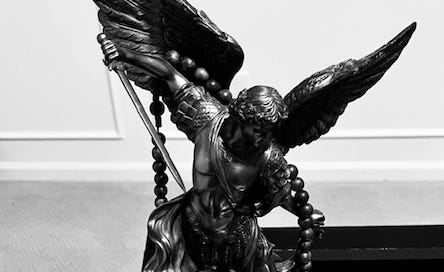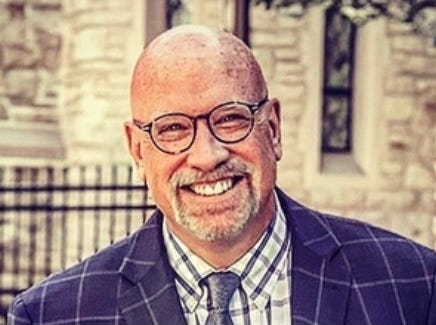In the disoriented landscape of the modern world, where technology shapes minds faster than truth can reach hearts, the family must rediscover its primal vocation as the domestic church. This term is not poetic—it is foundational. It means that the home is meant to be a place of worship, formation, and mission. In our time, marked by the collapse of generational continuity and moral clarity, this truth has never been more urgent.
I. The Cultural Storm
The winds of modernity are not neutral. They tear at the fabric of the family, trivialize fatherhood and motherhood, and replace spiritual inheritance with endless noise. Children today are often catechized by the internet before they are taught the Creed. The family must become more than a safe space—it must become a stronghold of faith, a school of virtue, and an embassy of Heaven.
“The Christian home is the place where children receive the first proclamation of the faith. For this reason the family home is rightly called ‘the domestic church,’ a community of grace and prayer, a school of human virtues and of Christian charity.”
— Catechism of the Catholic Church, 1666
II. Faith: Teaching by Living
Faith is caught more than taught. It is made visible in small acts of fidelity: the mother praying a Hail Mary while folding laundry, the father genuflecting with reverence before the Eucharist, the child learning to see Sunday Mass as the center of the week, not a mere obligation.
“Let everything take second place to our care of our children, our bringing them up in the discipline and instruction of the Lord.”
— St. John Chrysostom, Homily on Ephesians 6
The domestic church is where the Incarnation becomes concrete. Just as the Word became flesh in the womb of Mary, so must the Word take flesh again in the rhythms of family life.
III. Family: The Furnace of Love
Family life is where love is forged—not the love of sentiment, but of sacrifice. In a culture that worships autonomy and instant gratification, the family must model covenantal love: enduring, faithful, fruitful.
“As the family goes, so goes the nation and so goes the whole world in which we live.”
— St. John Paul II
Marriage, rightly lived, is not merely the pursuit of personal happiness—it is a path to sanctity. It is the sacrament in which spouses become co-creators with God, not only of life but of holiness. Children raised in such a furnace will feel the heat—not always comfortable, but life-giving.
IV. Formation: Daily Discipleship
Formation is not a seasonal program; it is a way of life. The home is where children learn not only the truths of the faith but how to pray, how to repent, how to serve, and how to hope.
“Train up a child in the way he should go; even when he is old he will not depart from it.”
— Proverbs 22:6
The formation of children begins with the formation of parents. A father who kneels to pray with his children teaches more than a thousand lectures. A mother who prioritizes virtue over vanities forms the heart of her home.
Consider simple practices:
The Morning Offering at breakfast.
A decade of the Rosary after dinner.
Celebrating feast days with joy and intention.
Practicing holy silence once a week.
“Your home is a church; it is your duty to take care of it in every respect.”
— St. Clement of Alexandria
V. Following God’s Way: Living in Sync with Heaven, Not the World
The greatest crisis in the modern family is not external pressure—it is internal disorientation. We have forgotten that there is a way. God's law is not a burden; it is the divine roadmap to human flourishing. To ignore it is not merely to sin—it is to become disordered, out of tune with creation, grace, and ultimately, our own nature.
“For my thoughts are not your thoughts, neither are your ways my ways, declares the Lord. … My word shall not return to me empty, but it shall accomplish that which I purpose.”
— Isaiah 55:8–11
When families choose to follow the world’s definitions of love, success, and freedom, they may gain temporary approval—but lose the harmony that comes from being aligned with God’s eternal truth. This is why Catholic homes often feel spiritually restless or anxious when God’s way is sidelined. As St. Augustine famously wrote:
“You have made us for Yourself, O Lord, and our hearts are restless until they rest in You.”
— St. Augustine, Confessions I.1
1. The Path vs. the Pitfall
Scripture consistently presents us with a choice: walk in the way of the Lord, or stumble in the dark.
“See, I have set before you today life and good, death and evil. … Therefore choose life, that you and your offspring may live, loving the Lord your God…”
— Deuteronomy 30:15–20“There is a way that seems right to a man, but its end is the way to death.”
— Proverbs 14:12
Families that choose entertainment over Eucharist, autonomy over obedience, or comfort over conversion, gradually unmoor themselves from the lifeline of grace. The consequences are visible: fractured relationships, weakened virtue, and a loss of moral clarity.
2. Forming Children in the Way of the Lord
To follow God’s way means instructing children not merely in the content of the faith, but in a life of joyful submission to God's law. It is the duty of parents to make obedience beautiful—not burdensome. This means teaching children that discipline is not repression, but freedom.
“Whoever spares the rod hates his son, but he who loves him is diligent to discipline him.”
— Proverbs 13:24“Fathers, do not provoke your children to anger, but bring them up in the discipline and instruction of the Lord.”
— Ephesians 6:4
St. John Chrysostom, one of the greatest early Church teachers on family life, put it bluntly:
“Let us make them from the earliest age lovers of wisdom. Let us accustom them to bridle the belly, to be master of their passions, to be indifferent to money, to be generous, to love the poor, to shun luxury.”
— St. John Chrysostom, Homily on Matthew 19
This is the essence of formation: aligning the heart with the truth, so that obedience to God is not resented, but embraced.
3. Out of Step with the World, In Step with Christ
Christ Himself warned us that following Him would mean rejection by the world:
“If the world hates you, know that it has hated me before it hated you.”
— John 15:18“Enter by the narrow gate. For the gate is wide and the way is easy that leads to destruction… For the gate is narrow and the way is hard that leads to life, and those who find it are few.”
— Matthew 7:13–14
Families must embrace this reality: we are not meant to fit in. We are meant to be a sign of contradiction. The early Christians were often despised by the culture because they rejected killing others, immorality, and idolatry. Sound familiar?
“Christians dwell in their own countries, but only as sojourners. … They marry, as do all; they beget children; but they do not destroy their offspring.”
— Epistle to Diognetus, 2nd century
To walk God's way means being misunderstood. But it also means walking in light and truth.
“The way of the wicked is like deep darkness; they do not know over what they stumble. But the path of the righteous is like the light of dawn, which shines brighter and brighter until full day.”
— Proverbs 4:18–19
4. The Catechism: Obedience as Love
The Catechism offers a striking view of obedience—not as servitude, but as the fruit of love and the means to holiness:
“Obedience is the submissive attitude of the heart toward the will of God. Jesus teaches us that love for him entails keeping his commandments.”
— CCC 2826, referencing John 14:15
This submission is not blind—it is trustful. Just as Christ was obedient unto death, so must the family become cruciform: shaped by the cross, not by comfort.
“He humbled himself and became obedient to death—even death on a cross!”
— Philippians 2:8
And just as Christ’s obedience brought resurrection, so our obedience brings peace.
5. Living Heaven’s Rhythm
To live in God’s way is to live with eternity in mind. It’s not simply about resisting sin, but about conforming our homes to the rhythm of Heaven: grace, prayer, order, love.
This means Sunday is a day of worship, not errands.
It means fasting has a place alongside feasting.
It means silence is honored, not feared.
It means the calendar revolves not around sports or school, but around the liturgical year.
“Your kingdom come, your will be done, on earth as it is in heaven.”
— Matthew 6:10
To follow God’s way is to prepare our children to walk in the truth long after we are gone. It is to form saints—not simply well-adjusted citizens. It is to become in sync not with the spirit of the age, but with the Spirit of God.
VI. Conclusion: Building Altars, Not Screens
The Church will be renewed when families are renewed. The altar must return to the center of the home—figuratively and literally. Replace the glowing screen with the glowing candle. Replace endless scrolling with sacred silence. Build altars of devotion, discipline, and love.
“The future of humanity passes by way of the family.”
— St. John Paul II, Familiaris Consortio
Let us not underestimate the power of the family. The home that is faithful becomes a beacon in the dark, a training ground for saints, a bulwark against chaos. In every crucifix hung on a wall, every child taught to make the Sign of the Cross, every shared grace before meals—there begins the quiet revolution.
Welcome to the St Michael’s Group! In a world facing a decline in religious belief and an increase in moral confusion, the need to reignite our faith has never been more critical. Religion’s capacity to offer meaning, foster ethical behavior, and build cohesive communities is vital for countering the spread of spiritual apathy and the influence of evil. By renewing our commitment to faith, we can combat the forces that seek to divide and weaken us. Reigniting our faith lives, therefore, is not just a personal endeavor but a collective responsibility. It is essential for preserving the moral and spiritual fabric of our society, ensuring that love, compassion, and justice continue to be the guiding principles of human existence.
This is why I started the St. Michael’s Group Substack and Podcast. Join us today stmichaelsgroup.substack.com and let’s start a movement of reigniting faith, family, and formation back into our lives.
This is Dr. Currie Myers. I am an applied criminologist and criminal justice ethicist. I have been on faculty in the criminology department at Benedictine College for over 13 years and was a career law enforcement officer for 24 years. Most importantly I have a beautiful family. My wife and I have been married for 37 years, and we have five children and 10 grandchildren. You can view my work on applied criminology at drcurriemyers.substack.com. Have a great and blessed week and please subscribe and share this podcast with others. And more importantly, if you are struggling in life and need someone to talk to, we have a chat function that you can contact me directly. And if you wish for me to speak at one of your events, please contact (catholicspeakers.com) to schedule.
If this episode moved you, I invite you to share it with someone you love. Let this be a holy conversation starter. And if you haven’t already, spend time in front of the Cross this weekend. Not to look at it, but to be changed by it.
Thanks for joining me! Stay rooted in faith, sharpened by virtue, and courageous in truth. God bless you, and I’ll see you next time on The St. Michael’s Group Podcast.
Dr Currie Myers, America's Criminologist - Former Agonistic turned Convert to the Catholic Faith. Dr. Myers is a published author and speaker. Contact (catholicspeakers.com) for Dr. Myers to speak at your event!
















Share this post